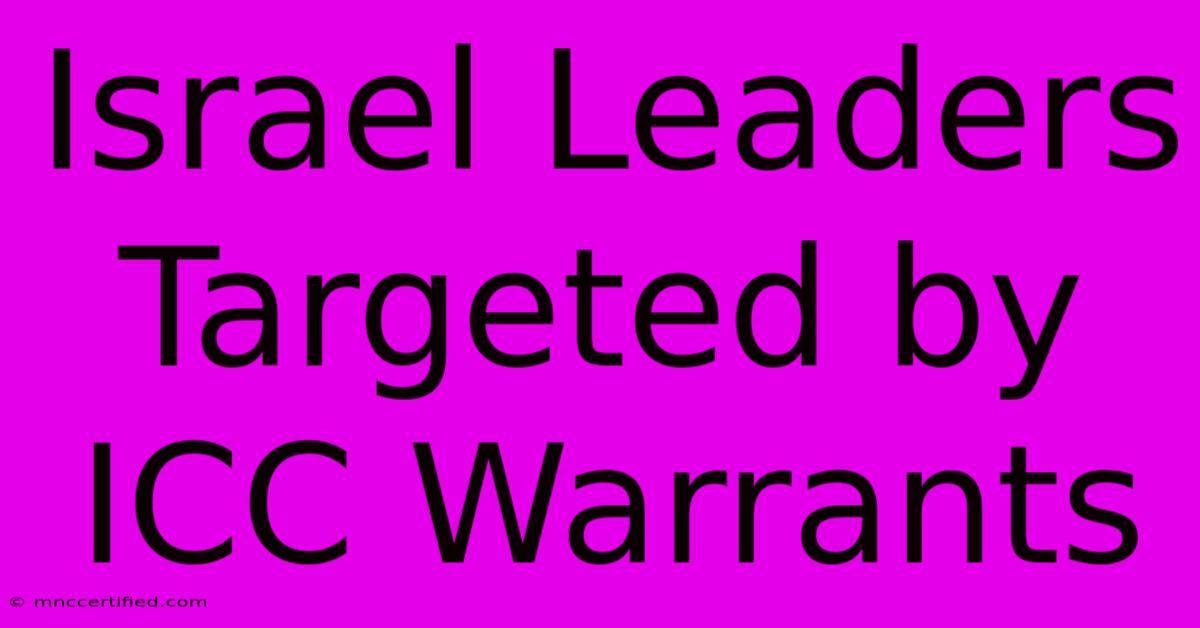Israel Leaders Targeted By ICC Warrants

Table of Contents
Israel Leaders Targeted by ICC Warrants: A Deep Dive into the Controversy
The International Criminal Court's (ICC) investigation into alleged war crimes in the Palestinian Territories has ignited a firestorm of controversy, particularly focusing on the potential targeting of Israeli leaders. This article delves into the complexities of the situation, examining the ICC's jurisdiction, the accusations leveled, Israel's response, and the broader geopolitical implications.
Understanding the ICC's Jurisdiction
The ICC, established in 2002, is an independent international court with the mandate to prosecute individuals for genocide, war crimes, crimes against humanity, and the crime of aggression. Crucially, its jurisdiction is determined by several factors, including the acceptance of its jurisdiction by the state concerned or the referral of a situation by the UN Security Council. Palestine's declaration of acceptance of the ICC's jurisdiction in 2015 is a key element in the current investigation. However, Israel, along with the United States, does not recognize the ICC's authority in this matter.
This lack of recognition lies at the heart of the conflict. Israel argues the ICC lacks jurisdiction over its actions in the Palestinian Territories, claiming the territories are not a sovereign state and therefore not eligible for ICC investigation. The ICC's counterargument hinges on its interpretation of international law and the Palestinian declaration. The legal arguments are complex and fiercely debated by international legal scholars.
Accusations and Investigations
The ICC's investigation centers on alleged war crimes committed in the Palestinian Territories since June 13, 2014. Specific accusations involve potential violations of international humanitarian law during military operations, including allegations of disproportionate use of force, attacks on civilians, and the destruction of property. The investigation is ongoing, and the specifics of the accusations against individual Israeli leaders remain largely undisclosed at this stage.
The ICC's investigation is not without its critics. Many argue the process is biased against Israel and fails to consider the security challenges faced by the nation. Others question the practicality of prosecuting high-ranking officials from a state that doesn't recognize the court's jurisdiction.
The Geopolitical Landscape
The ICC's actions have significantly impacted the already volatile geopolitical landscape of the Middle East. The investigation has deepened the rift between Israel and the international community, with strong allies of Israel, notably the United States, expressing their opposition to the ICC’s involvement. This has created further tension in the already fragile peace process. Furthermore, the investigation highlights the complex relationship between international law, national sovereignty, and the pursuit of justice in conflict zones.
Israel's Response and International Implications
Israel has vehemently condemned the ICC investigation, characterizing it as politically motivated and biased. The Israeli government has refused to cooperate with the court and has taken steps to counter the investigation, including enacting legislation to protect its citizens from potential prosecution. This defiance, however, further escalates tensions and undermines the ICC's authority.
The international community remains deeply divided on this issue. While some nations support the ICC's investigation as a vital step towards accountability for alleged war crimes, others align with Israel, emphasizing the court's perceived bias and questioning its legitimacy in this specific context. This division underscores the challenges of applying international law in complex geopolitical situations.
Conclusion: An Ongoing and Complex Issue
The ICC's targeting of Israeli leaders remains a highly contentious issue with significant geopolitical ramifications. The debate centers on the fundamental principles of international law, national sovereignty, and the pursuit of justice in conflict zones. The ongoing investigation will undoubtedly continue to shape the relationship between Israel and the international community for years to come, highlighting the complex interplay between law, politics, and international relations. Further developments and legal challenges are expected. This situation demands continued attention and analysis from experts and policymakers alike.

Thank you for visiting our website wich cover about Israel Leaders Targeted By ICC Warrants. We hope the information provided has been useful to you. Feel free to contact us if you have any questions or need further assistance. See you next time and dont miss to bookmark.
Featured Posts
-
Girls Who Invest Acceptance Rate
Nov 22, 2024
-
Cy Young Awards For Skubal Sale
Nov 22, 2024
-
Sales Nl Cy Young Atlanta Triumph
Nov 22, 2024
-
Blair Honors Labours Prescott
Nov 22, 2024
-
Liberty Mutual Insurance Layoffs
Nov 22, 2024